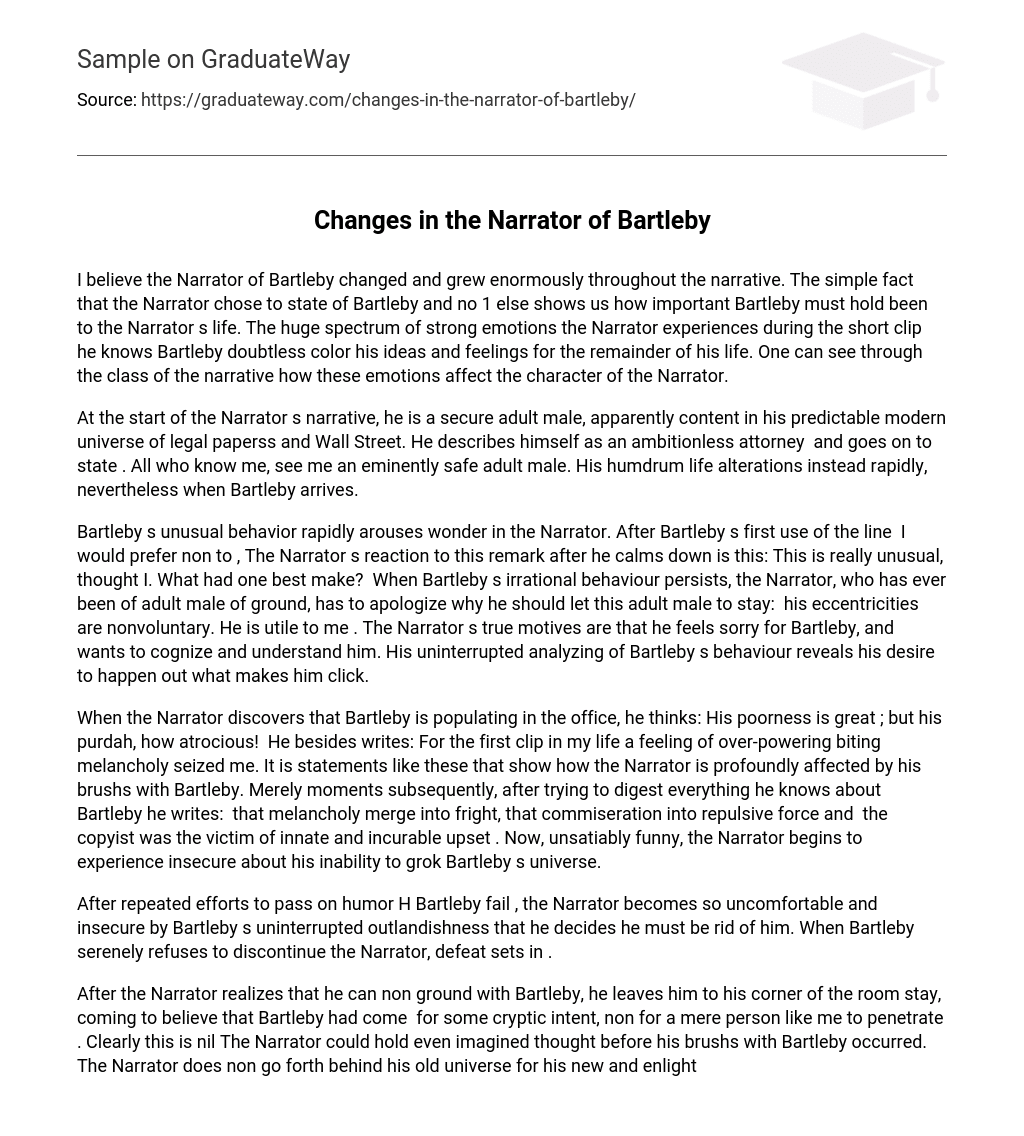I believe the Narrator of Bartleby changed and grew enormously throughout the narrative. The simple fact that the Narrator chose to state of Bartleby and no 1 else shows us how important Bartleby must hold been to the Narrator s life. The huge spectrum of strong emotions the Narrator experiences during the short clip he knows Bartleby doubtless color his ideas and feelings for the remainder of his life. One can see through the class of the narrative how these emotions affect the character of the Narrator.
At the start of the Narrator s narrative, he is a secure adult male, apparently content in his predictable modern universe of legal paperss and Wall Street. He describes himself as an ambitionless attorney and goes on to state . All who know me, see me an eminently safe adult male. His humdrum life alterations instead rapidly, nevertheless when Bartleby arrives.
Bartleby s unusual behavior rapidly arouses wonder in the Narrator. After Bartleby s first use of the line I would prefer non to , The Narrator s reaction to this remark after he calms down is this: This is really unusual, thought I. What had one best make? When Bartleby s irrational behaviour persists, the Narrator, who has ever been of adult male of ground, has to apologize why he should let this adult male to stay: his eccentricities are nonvoluntary. He is utile to me . The Narrator s true motives are that he feels sorry for Bartleby, and wants to cognize and understand him. His uninterrupted analyzing of Bartleby s behaviour reveals his desire to happen out what makes him click.
When the Narrator discovers that Bartleby is populating in the office, he thinks: His poorness is great ; but his purdah, how atrocious! He besides writes: For the first clip in my life a feeling of over-powering biting melancholy seized me. It is statements like these that show how the Narrator is profoundly affected by his brushs with Bartleby. Merely moments subsequently, after trying to digest everything he knows about Bartleby he writes: that melancholy merge into fright, that commiseration into repulsive force and the copyist was the victim of innate and incurable upset . Now, unsatiably funny, the Narrator begins to experience insecure about his inability to grok Bartleby s universe.
After repeated efforts to pass on humor H Bartleby fail , the Narrator becomes so uncomfortable and insecure by Bartleby s uninterrupted outlandishness that he decides he must be rid of him. When Bartleby serenely refuses to discontinue the Narrator, defeat sets in .
After the Narrator realizes that he can non ground with Bartleby, he leaves him to his corner of the room stay, coming to believe that Bartleby had come for some cryptic intent, non for a mere person like me to penetrate . Clearly this is nil The Narrator could hold even imagined thought before his brushs with Bartleby occurred. The Narrator does non go forth behind his old universe for his new and enlightened position of things, nevertheless, and fright of societal unacceptance drives him to divide himself from Bartleby. Unable to coerce himself to take Bartleby, The Narrator resolves to travel his full topographic point of concern. This is barely the act of an mean adult male. Bartleby must hold really much altered The Narrator for him to do such a curious determination.
When moved into his new location, The Narrator becomes paranoid and frights that Bartleby will come back to stalk him I kept the door locked, and started at every footstep. When confronted by the landlord and new renter about Bartleby, The Narrator tries to deny any association with him, but fright of societal castigation prompts him go and attempt to convert Bartleby to go forth the edifice or, at least, come place with him. This shows that The Narrator still wishes to stay a portion of his old universe and frights going a community castaway.
When The Narrator discovers that Bartleby is in gaol and that he must travel to the justice and do a statement, he states. At first I was incensed ; but at last, about approved. I believe this is because ab initio he feels he will ne’er be rid wholly of Bartleby, and so admits he does non yet want to to the full be rid of him. This idea is supported after he goes to the gaol and provinces. I so begged for an interview [ with Bartleby ] – he will forever desire to cognize Bartleby.
Bartleby so dies go forthing The Narrator everlastingly funny, oppugning the nature of the universe in general, and what it holds for each of us. I hope to hold shown some of the many widely varied ideas and emotions that shaped The Narrator during the really short clip in which he knew Bartleby, the Scrivener





